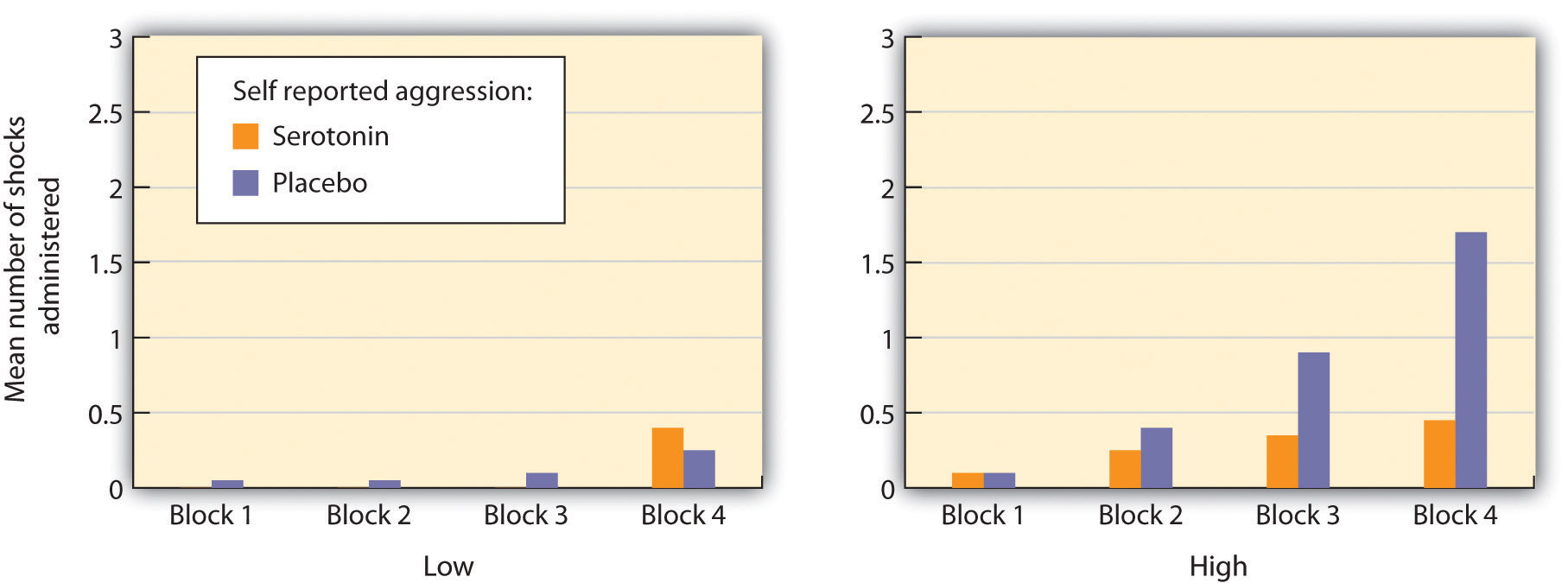Hormones are also important in creating aggression. Most important in this regard is the male sex hormone testosterone, which is associated with increased aggression in both animals and in humans. Research conducted on a variety of animals has found a strong correlation between levels of testosterone and aggression. This relationship seems to be weaker among humans than among animals, yet it is still significant (Dabbs, Hargrove, & Heusel, 1996).
In one study showing the relationship between testosterone and behavior, James Dabbs and his colleagues (Dabbs, Hargrove, & Heusel, 1996) measured the testosterone levels of 240 men who were members of 12 fraternities at two universities. They also obtained descriptions of the fraternities from university officials, fraternity officers, yearbook and chapter house photographs, and researcher field notes. The researchers correlated the testosterone levels and the descriptions of each of the fraternities. They found that the fraternities that had the highest average testosterone levels were also more wild and unruly, and in one case were known across campus for the crudeness of their behavior. The fraternities with the lowest average testosterone levels, on the other hand, were more well-behaved, friendly, academically successful, and socially responsible. Another study found that juvenile delinquents and prisoners who have high levels of testosterone also acted more violently (Banks & Dabbs, 1996). Testosterone affects aggression by influencing the development of various areas of the brain that control aggressive behaviors. The hormone also affects physical development such as muscle strength, body mass, and height that influence our ability to successfully aggress.
Although testosterone levels are much higher in men than in women, the relationship between testosterone and aggression is not limited to males. Studies have also shown a positive relationship between testosterone and aggression and related behaviors (such as competitiveness) in women (Cashdan, 2003). Although women have lower levels of testosterone overall, they are more influenced by smaller changes in these levels than are men.
It must be kept in mind that the observed relationships between testosterone levels and aggressive behavior that have been found in these studies cannot prove that testosterone causes aggression—the relationships are only correlational. In fact, the effect of aggression on testosterone is probably stronger than the effect of testosterone on aggression. Engaging in aggression causes temporary increases in testosterone. People who feel that they have been insulted show both more aggression as well as more testosterone (Cohen, Nisbett, Bosdle, & Schwarz, 1996), and the experience of stress is also associated with higher levels of testosterone and also with aggression. Even playing an aggressive game, such as tennis or chess, increases the testosterone levels of the winners and decreases the testosterone levels of the losers (Gladue, Boechler, & McCaul, 1989; Mazur, Booth, & Dabbs, 1992). Perhaps this is why the fans of the Montreal Canadiens, a professional ice hockey team, rioted after their team won an important game against the Pittsburgh Penguins in 2010.
Testosterone is not the only biological factor linked to human aggression. Recent research has found that serotonin is also important, as serotonin tends to inhibit aggression. Low levels of serotonin have been found to predict future aggression (Kruesi, Hibbs, Zahn, & Keysor, 1992; Virkkunen, de Jong, Bartko, & Linnoila, 1989). Violent criminals have lower levels of serotonin than do nonviolent criminals, and criminals convicted of impulsive violent crimes have lower serotonin levels than criminals convicted of premeditated crimes (Virkkunen, Nuutila, Goodwin, & Linnoila, 1987).
In one experiment assessing the influence of serotonin on aggression, Berman, McCloskey, Fanning, Schumacher, and Coccaro (2009) first chose two groups of participants, one of which indicated that they had frequently engaged in aggression (temper outbursts, physical fighting, verbal aggression, assaults, and aggression toward objects) in the past, and a second group that reported that they had not engaged in aggressive behaviors.
In a laboratory setting, participants from both groups were then randomly assigned to receive either a drug that raises serotonin levels or a placebo. Then the participants completed a competitive task with what they thought was another person in another room. (The opponent’s responses were actually controlled by computer.) During the task, the person who won each trial could punish the loser of the trial by administering electric shocks to the finger. Over the course of the game, the “opponent” kept administering more intense shocks to the participants.
As you can see in Figure 9.6, the participants who had a history of aggression were significantly more likely to retaliate by administering severe shocks to their opponent than were the less aggressive participants. The aggressive participants who had been given serotonin, however, showed significantly reduced aggression levels during the game. Increased levels of serotonin appear to help people and animals inhibit impulsive responses to unpleasant events (Soubrié, 1986).

Participants who reported having engaged in a lot of aggressive behaviors (right panel) showed more aggressive responses in a competitive game than did those who reported being less aggressive (left panel). The aggression levels for the more aggressive participants increased over the course of the experiment for those who did not take a dosage of serotonin but aggression did not significantly increase for those who had taken serotonin. Data are from Berman et al. (2009).
- 17953 reads






